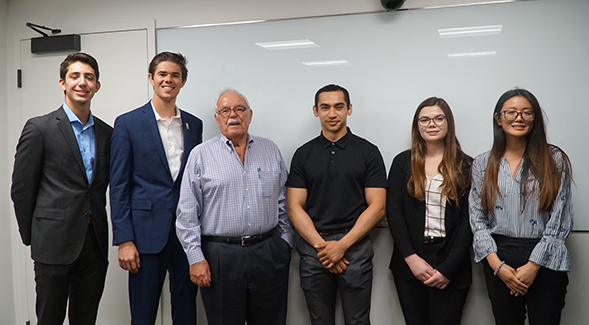Jim Sinegal: Lessons From the Front Line
The SDSU alumnus shared his views on ethics, arrogance and hard work.

How did that reputation evolve? One decision at a time, Sinegal said, and he tells the following story to prove his point.
Annual double-digit increases in health care costs were hitting Costco’s bottom line hard. Sinegal and his management team decided to tell employees that, going forward, the company would pay 90 percent of health insurance premiums rather than the 95 percent previously financed.
After the adjustment, Costco management discovered they were actually paying about 88 percent of the costs, slightly less than their commitment.
“We felt obligated to rectify the situation because we had made a promise to our people,” said Sinegal during a visit to San Diego State University in April. “But we realized that if we added the difference to their paychecks, it would be taxable income, so we deposited it into their 401k plans.”
That simple narrative inspired students who heard Sinegal speak during SDSU’s inaugural Ethics Week, presented by SDSU's Fowler College of Business. He was the keynote speaker at the Lang Lecture, an annual event established by a gift from Linda Lang (’91, LHD ‘13) and Tom Lang ('67) to reinforce the Fowler College mission of promoting positive impact through ethical leadership.
Ethics at the core
“I was impressed by his examples of good business practice and by the way Costco looks after its employees,” said Hannah Rogers, who will graduate this month with distinction in her major, business management. Rogers received the 2019 Lang Student Award for Outstanding Ethical Leadership.
“He was funny too,” Rogers added. “He’s all about Kirkland (Costco’s signature brand), and even that day, he was wearing a Kirkland shirt.”
Ethics Week is the brainchild of Lance Nail, Fowler College dean, who believes ethics must be a core principle of business education, taught in the context of real-life situations.
“We do our students a disservice if we tell them ‘we know you’re going to do the right thing and it’s going to be easy,’” Nail said. “Jim Sinegal is proof that business people can make healthy profits while conducting themselves ethically and building a value-based corporate culture that invests in its people.”
No easy successes
Asked whether today’s corporate culture breeds unethical behavior, Sinegal said most companies “are trying to do it right. What we went through in 2008 was a wake-up call,” he added, referring to the subprime mortgage crisis and financial market collapse that forced governments to rescue several established financial institutions. Now, a decade later, there is a greater tendency to consider all stakeholders—and not just shareholders—in company decisions, he said.
Sinegal warned aspiring entrepreneurs to expect hard times and uncertainty on the road to success, and he recalled working decades “to learn my craft” before cofounding Costco at age 46.
“There were times when we wondered if we were going to meet the payroll. Every business goes through that. The examples young people see most often are billionaires like Bill Gates and Steve Jobs. They forget that Gates and his partner were working 24/7 and sleeping on a garage floor and that Jobs was at one point fired from his company.
“There are a lot of smart, hardworking people out there, and not all of them make it. You earn a reputation for ethical practice by being consistent and avoiding arrogance. It’s easy to get corrupted if you’re not paying attention on a daily basis.”



